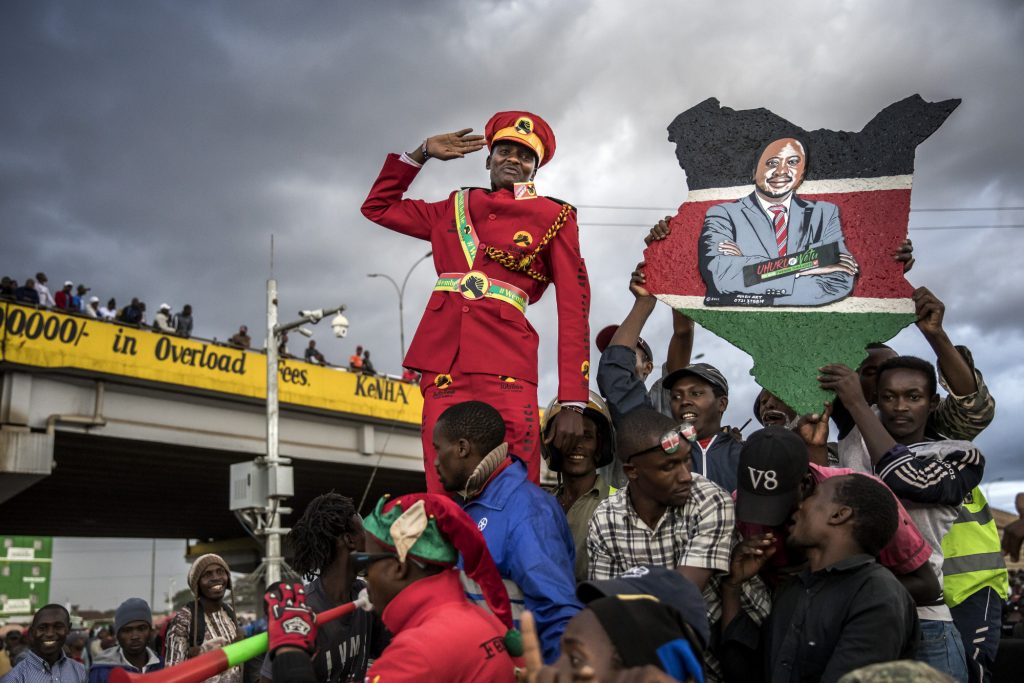Kenyan President Uhuru Kenyatta is certain to win re-election in Thursday’s vote rerun after his main rival, Raila Odinga, withdrew from the race, but his victory could prove to be a hollow one.
“It would be a Pyrrhic victory for Kenyatta, especially if opposition strongholds boycott as they have promised,” said Nanjala Nyabola, a Nairobi-based independent political analyst. “It may have serious implications for his ability to govern.”

Photographer: Luis Tato/Bloomberg
The Supreme Court, which annulled the Aug. 8 vote, said Wednesday it couldn’t hear a petition to cancel the rerun because of a lack of a quorum. On Monday, Western envoys proposed a delay, which electoral commission Chairman Wafula Chebukati has indicated he also favors by saying he can’t guarantee the election will be credible and is meeting opposition to carrying out reforms from other commissioners. Kenyatta, 55, wants the ballot go ahead.
An open-ended opposition rejection of Kenyatta’s right to hold office would exacerbate a political standoff that’s already unnerved investors, scared off tourists and dragged down the nation’s stocks and international bonds. As many as 67 people have died in protests since the last vote results were announced, according to rights groups such as Amnesty International, and the opposition has vowed to stage protests until its demands for electoral reform are met.
Restraint Urged
World figures from Pope Francis to United Nations Secretary-General Antonio Guterres have joined calls for restraint.
There’s a risk that Kenya could be plunged into chaos should the Independent Electoral & Boundaries Commission forge ahead with the vote, said Ndung’u Wainaina, executive director at the International Center for Policy and Conflict.
“The IEBC can invoke constitutional provisions and call off the election,” Wainaina said by phone from Nairobi. If it does go ahead, “they should be prepared to live with the consequences,” he said.
The European Union and the Atlanta-based Carter Center both announced they’re reducing the size of their delegations to monitor the elections, citing security concerns.
“We have assessed the safety of our observers considering the extreme tension, disruptions of polling preparations, and strong criticism that has been made of the international community,” the EU Election Observation Mission said in an emailed statement. “Based on this, we have had to reconsider the extent to which we can observe across the country.”
Election Violence
Two months of ethnic violence that followed a disputed 2007 vote showed just how violent Kenyan politics can turn — more than 1,100 people were killed and about 350,000 were forced to flee their homes. The unrest hammered the economy, with the growth rate plummeting to 1.7 percent in 2008, from 7.1 percent a year earlier. Kenya is the East African hub for companies including General Electric Co. and Toyota Motor Corp.
Investor unease is evident in the financial markets. The Nairobi Securities Exchange All Share Index has fallen the most in Africa since the election outcome was declared void on Sept. 1, according to data compiled by Bloomberg. The government’s international bonds due in 2024 have also dropped since then, with yields climbing 29 basis points to 6.31 percent.
Odinga, 72, pulled out of the contest after the nation’s electoral commission rejected his demands to fire staff who oversaw the previous botched vote that handed victory to Kenyatta.
‘Millions Disenfranchised’
“A leading candidate who garnered more than six million votes has withdrawn from the race,” Chebukati said in a statement last week. “While it is his right, we must think beyond him and think of the six million Kenyans who will feel disenfranchised by this action. Do we just go on as if withdrawal means nothing?”
Odinga described the election as a “sham exercise that is being forced upon the nation” and called on the electoral commission to do the honorable thing and call it off. William Ruto, Kenyatta’s deputy, accused the opposition of “running away from a humiliating defeat,” while acknowledging that its withdrawal may erode the election’s legitimacy.
“Everything seems to be going the way of the election taking place,” Alex Benkenstein, head of the South African Institute of International Affairs’ Governance of Africa’s Resources Programme, said by phone. “The ballot papers are there, all the machinery is moving forward, but potentially you could still have a turnaround in the final hour. Certainly there are legitimate grounds for the IEBC to ask for a postponement.”
Robert Besseling, executive director of political risk advisory firm EXX Africa Ltd., sees no quick fix to the political standoff.
“This is no longer an election which is in the hands of the Kenyan voters,” he said in an interview in Cape Town. “This is an election which is in the hands of the judiciary and of the key power brokers in Kenya. This is not just a political, electoral process any more. Everything is open to legal or constitutional challenge. Essentially there is a vacuum in place in Kenya at the moment.”

